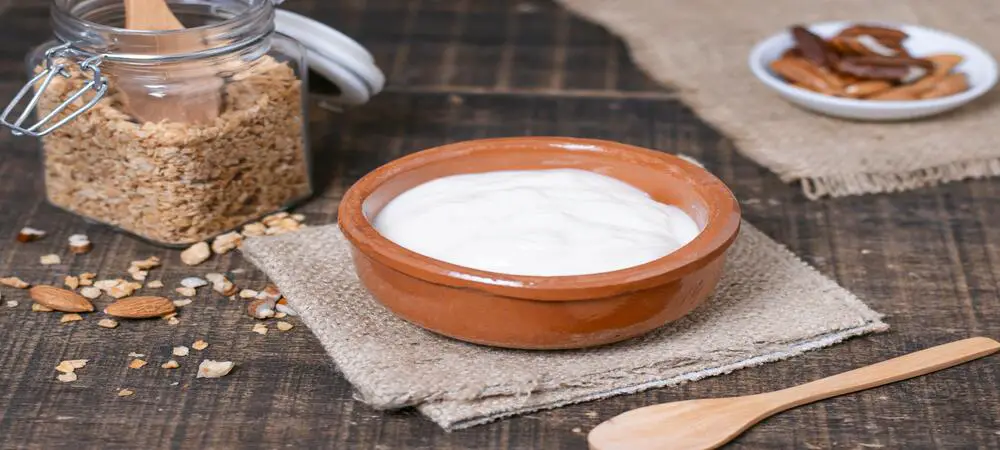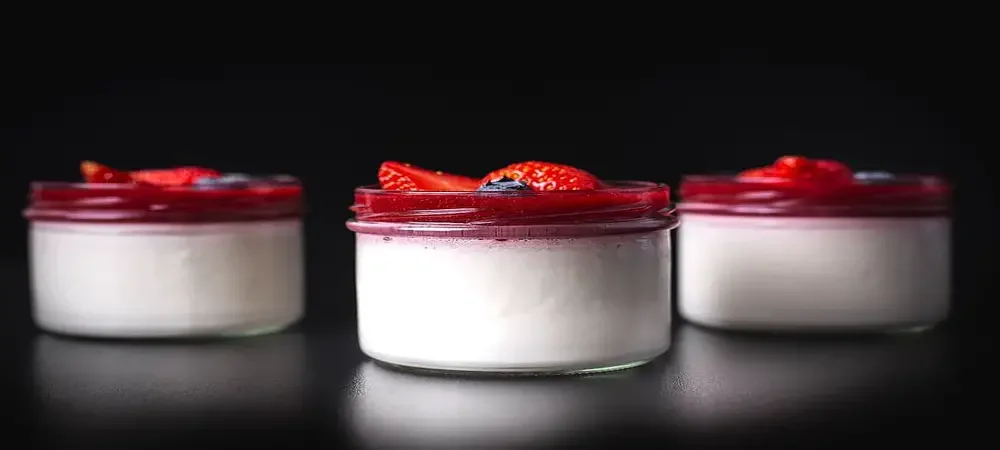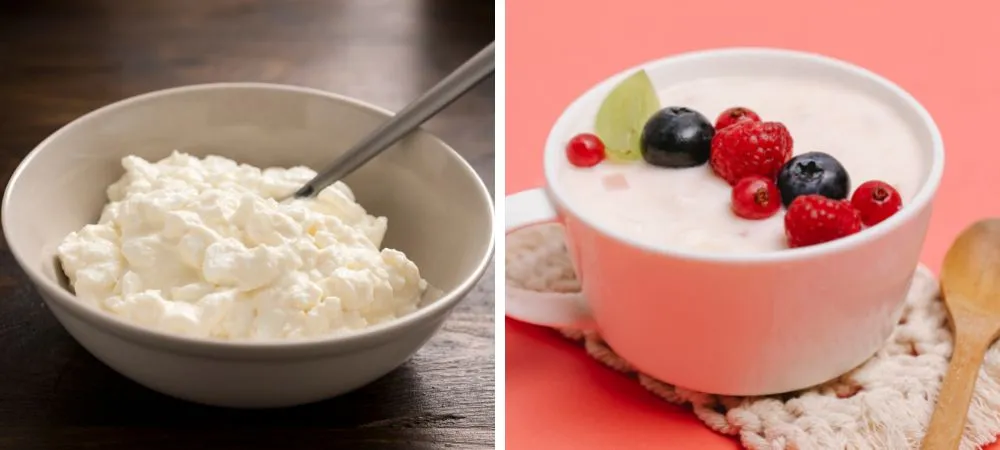Yogurt and Curd are the two dairy products that are incredibly famous. As both are made from the same base ingredient – Milk. Hence there are many queries doing rounds on the internet, Are they really the same? If you are reading this blog post, probably you might have the same confusion! Right?
| Yogurt and Curd are not the same as their making process brings in a huge variation in their texture and nutritional value. |
There is widespread confusion between curd and yogurt, especially since they are both made from milk. Many people get’s confused with curd as Indian Yogurt, which is not the case. According to Wikipedia, the word curd derives from the cuddling of milk which can be natural (by leaving raw milk to sour) or by adding acidic agents like vinegar or lime. Hence, curd can never be any form of yogurt as the process of making the two are absolutely different.
Before we run into deep analysis on Curd Vs Yogurt and which one to buy, I have shortlisted some of the best curds available on amazon to try so that you can factually understand the difference between the two:
Related Posts
- Greek Yogurt Vs Turkish Yogurt – Which has high nutrition
- Grass-feed Whole Milk Yogurt Vs Coconut yogurt – Nutritional Facts!
- Yogurt Vs Milk – what should i choose?
- Sour Cream Vs Yogurt – Can i substitute yogurt for sour cream?
- Kefir Vs Yogurt – What makes them different?
- Regular Yogurt Vs Greek Yogurt – Which one should I buy?
- Frozen Yogurt Vs Ice-cream – Which is better
What is Curd?
A Curd is a thickened batter made by adding an acid such as lemon, vinegar, buttermilk, or curdled milk to hot milk and letting it cool down for a few minutes. The acid causes tiny particles of the casein protein (the significant protein present in milk) to coagulate into larger ones that make the curd thick. According to Wikipedia, ‘Curd is obtained by coagulating milk into the sequential process called cuddling’
It is often referred to as the first stage of cheese making where the increased acidity tangles the milk proteins leading to solid masses. Raw milk left to sour naturally produces curds to produce sour milk cheese. These curds are then further pressed and drained to varying amounts to produce different amounts of cheese.
What is Yogurt?
Yogurt is very much different from Curd. As per the American dictionary, Yogurt is the cultured milk product produced from heating and fermenting milk and adding bacteria into it.
In other words, curdled milk is Curd, while yogurt will contain millions of live bacteria beneficial to our body.
Yogurt is generally used as a starter for fermentation and making other products like Cheese, buttermilk, etc.
Yogurt can be/cannot be thicker than Curd, but it does have a much milder taste than you would expect.
Health Benefits of Yogurt over Curd

While curds and yogurt are made from the same source, i.e., milk, there’s quite a lot of difference between them, both in taste and health benefits. The most significant advantage of consuming Yogurt is that it is full of good bacteria and probiotics.
Here are reasons why you should consider eating more yogurt than curd:
1. High in Protein
Both curds and yogurt are good sources of protein, but yogurt has a higher protein concentration. Proteins help in the development and maintenance of your body tissues and help repair muscles after a workout.
Proteins also help maintain blood pressure levels, keep your skin healthy and protect your body from infections. Hence, if you want to escalate your protein intake, choose yogurt over curd.
2. High in Calcium
Yogurt is rich in calcium which helps in strengthening bones. A glass of yogurt will provide you with about 30% of the daily requirement of calcium. Calcium is an essential mineral that helps in the development and maintenance of strong bones.
Calcium also helps in keeping your teeth healthy. Hence, eating yogurt over curd gives you more health benefits.
3. Great Source of Potassium
Yogurt is a good source of potassium which works with sodium and other nutrients to maintain normal blood pressure. Potassium also helps in protecting nerves from damage, heart function, and metabolism as well.
It has also been found that potassium helps lose weight by cutting down food cravings and helping you feel fuller for longer.
4. Sources Vitamin B12
Yogurt is a good source of Vitamin B12, which helps in keeping the nerve and blood cells healthy. It also keeps the nervous system working well by protecting it from free radicals. Vitamin B12 is also required for metabolism and the synthesis of fatty acids.
5. Lesser Lactose
Yogurt has less lactose. Hence, yogurt is an excellent way to replace curd if you have irritated bowel syndrome due to high lactose intake.
So, the next time you ask what’s the difference between curd and yogurt, remember that it’s all about how they’re made.
Curd is essentially the solid part of milk that has been separated, whereas yogurt contains live bacteria, which enhance its health benefits. So instead of having coagulated milk with no probiotics qualities, try adding more yogurt to your diet to get all the essential nutrients you need.
Frequently Asked Questions
Is curd and yogurt the same?
Curd and yogurt are similar in that they are both fermented dairy products made by adding bacterial cultures to milk, which causes the milk proteins to coagulate and form a semi-solid consistency. However, there are differences between the two in terms of their production process, bacterial cultures used, and taste.
Which is better yogurt or curd?
The primary difference lies in the bacterial cultures used. Curd is typically made using a combination of lactic acid bacteria, while yogurt is made using specific strains of bacteria like Lactobacillus bulgaricus and Streptococcus thermophilus. This difference in bacterial cultures contributes to the distinct taste and texture of each product.
It’s difficult to say which one is better, as it depends on personal preference and intended use. Yogurt tends to have a smoother, creamier texture and a slightly tangier flavor, while curd has a more granular texture and a milder taste. Both have probiotic benefits and are rich in nutrients like calcium and protein.
Why do Indians call yogurt curd?
In India, the term “curd” is often used interchangeably with “yogurt.” This is mainly due to cultural and linguistic differences. In India, curd (or “dahi” in Hindi) is a staple in many households and is traditionally made by adding a small amount of previously prepared curd to warm milk and allowing it to ferment.
Can I replace yogurt with curd?
You can often replace yogurt with curd in recipes, but the results may vary slightly in terms of taste and texture. If you need a substitute for yogurt, it’s best to use a similar type of yogurt (e.g., plain, unsweetened, or flavored) for the most accurate results. When substituting curd for yogurt, be mindful of the differences in texture and tanginess, and adjust your recipe accordingly.
What is Yogurt Called In India?
Yogurt is popularly known as ‘Dahi’ in India. Dahi is more like regular yogurt and is widely used in many Indian recipes and curries.
Does Curd Contains Probiotics?
No Curd has no probiotics as it is making by coagulating the milk and not by fermenting the milk using probiotics.





